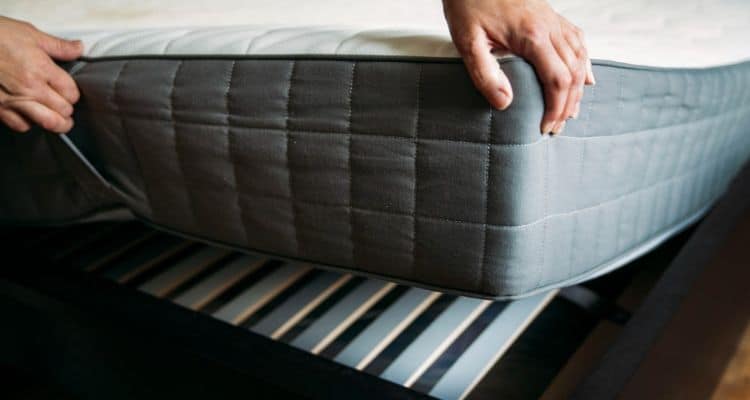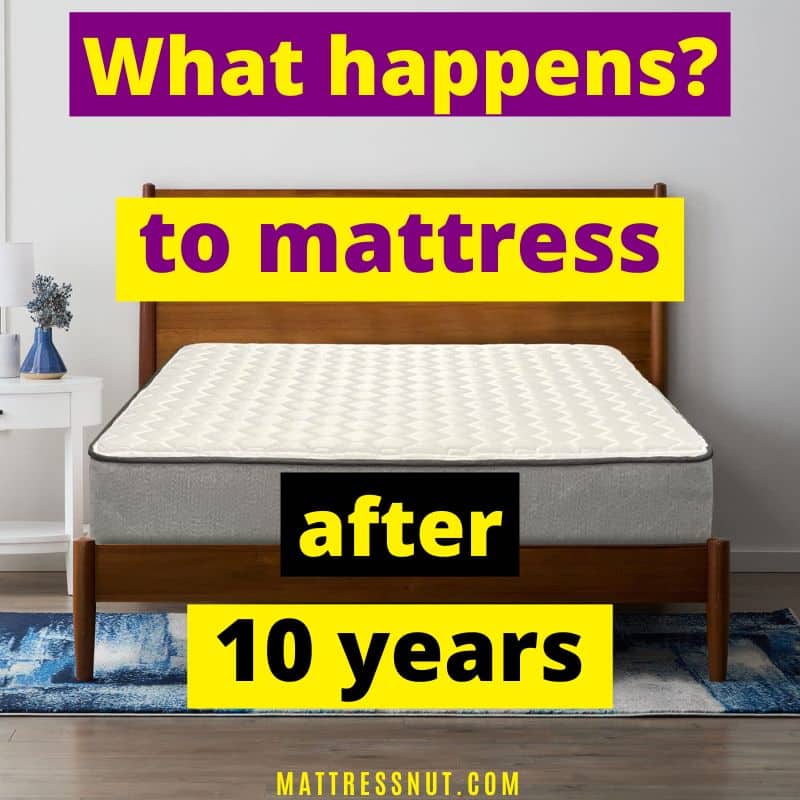Have you ever wondered if the favorite part of your bedroom is your soft, comfy bed? On those tiring days, your cool bedding allows you to relax and have a good night’s sleep (check 10 top rated mattresses). The nights you dunk yourself in the comfort of your bed while reading a nice book.
A cup of hot chocolate nails the serenity. Or the movie nights that you enjoyed, hugging your bed. Your bed was the one that took care of it all. But the quality of your beauty sleep and the luxury that you experience might deteriorate over time.
Don’t Feel Rested When You Wake
After every tiring and laborious day, the one thing that your body needed was a bouncy, soft bed that you could relax on. But have you ever had the feeling that the bed you wished to sleep in all day is no longer appealing? The fresh morning you were having is now becoming an irritable start.

You do not feel quite rested and miss those lazy warm-ups in bed. The quality and comfort your mattress promised are becoming obsolete. Well, it feels like your mattress has done the job for quite a long time (check 10 mattresses with great comfort).
Wake Up with Aches and Pain and Holding Your Back
Do backache and sore neck welcome your mornings? The ache-less ventures you had during sleep are invaded by the pain and discomfort you normally don’t experience.
Unless you can attribute any logical cause for these aches, like exercise or any health issue, your mattress might be the one to blame. Especially if the ache withers away as the morning progresses, it might welcome you with stiff shoulders and joints.
All the high-quality and luxury mattresses are designed with firmness and comfort. They use different forms and modes to provide perfect pressure balance so that you have those ache-less mornings for a productive day (also check 10 great mattresses for back pain).
Suffering from Bad Dust Allergies
Is a new allergy that you haven’t encountered in a long time suddenly ruining your sweet mornings? You would not like a stuffy nose. Neither of you will welcome constant sneezing and wasting all those tissues for an unwanted inconvenience. If no other medical causes are related, heaps of dust mites and allergens might be your partner for a good night’s sleep.
No matter how clean you keep your mattress, dust particles in your environment will find a way to bother you. So choosing mattresses that are allergen and dust-mite-resistant is important (also check the best selling bed sheets for allergies).
Spring Mattress Squeaks or Your Box Spring Creaks
Mattresses use various methodologies like springs and coils and gel or foam layers to provide the ideal support. They help distribute the weight equally, making your body comfortable and cushioned (also check 10 amazing mattresses for overweight people). You can let go of all the stress building up in your joints. But if tossing and turning produce creaks and screeches, it pinches your brain and distracts your sleep.
All this off-putting noise agitates your peace of mind. It shatters your intention of spending some quality time with your partner (also check the top rated mattresses for couples).
Well, if the bed frame is all sturdy and okay, then you should listen closely. It might be the coils in your spring mattress. The coils used are very sturdy and firm. They could brace all the weight. But, over time, things do lose their durability and functionality.
You Have a Visible and Noticeable Slag
Over time, the coils, the various layers of foam, and the filing used for the mattress start to deteriorate. Especially the places where most of the weight is experienced. The ultimate result is a sagging mattress (also check the best selling toppers for sagging mattress). The firm and the strong top are no longer completely linear or feel aligned to the touch. You can surely feel the pits and sags while lying.
The abnormal sinking is no longer pleasant while trying to rest your back. It feels as if different levels of height and firmness are present on the same bed. Because of these differences, you lose your ticket to freely moving during sleep. You either remain in the sagging portion or avoid it. Your back can never restfully. This leads to a sore lower back and painful sleep.
When To Replace Your Mattress – Top Signs

While the durability and lifespan depend on its manufacturing and usage, an average mattress can stretch to live a maximum of 7-8 years. Well, it doesn’t mean you have to throw it out immediately. You can still use it, but it will come at the cost of your deteriorating health and sleep. It’s only wise to spend on a new mattress rather than paying bills to treat your aching body.
Especially looking into buying a new one is important if you see and experience the following signs.
Prominent Sagging
Not only does it give a bad presentation, but it is extremely uncomfortable. The asymmetry makes it super unpleasant to sleep on.
Painful and Sore Mornings
The perfect mattress is supposed to provide such a balance of firmness and softness that all the pain and stress of the day vanishes once you cuddle in it. If every other morning is achy and sore, limbs stiff and hurting, it is apparent that your mattress fails to accomplish the goal. Getting a new one will rescue your mornings.
Attack by Dust Mites
The mattress which claims to be your good night partner is getting older if you continuously suffer from allergies. It can be due to the pungent odor of the latex due to wear and tear or by the mites. It might worsen with time, affecting your overall health. Get rid of it as soon as possible before it’s too late.
Exceeded Life Span
All luxury mattresses claim high-quality support and provide a certain life span (check 10 amazing hotel mattresses). A mattress usually has a maximum life span of 8-10 years. This is the time period when the companies can ensure a firm and comfortable mattress ideal for your sleep and health. Eventually, everything with continued use experiences some wear and tear, which will be most visible after this.
Disturbed Night Sleep
Do you have numerous waking during the night, perhaps even several times each hour? Being agitated by a sudden light wink or any sounds of insects that might invade your sleep.
After doing all the house chores, your body dreams of a perfect mattress that could heal itself by giving you some sound sleep. A new mattress is the only way to remove the resistance that might hamper your good night’s sleep.
What is the average price of a new mattress?
The average price of a new mattress ranges from $600 to $1,200. However, prices can vary widely depending on the size, type, materials, and brand of the mattress. Entry-level mattresses typically start around $300, while luxury mattresses can cost over $5,000. Foam and innerspring mattresses tend to be the most affordable options.
How can I make my mattress last longer?
To extend the life of your mattress, use a mattress protector from day one to shield it from spills and stains. Avoid jumping or standing on the mattress, and rotate it head-to-foot every 3-6 months to evenly distribute wear. Also, vacuum the mattress regularly using an upholstery attachment to remove dust and allergens.
What are signs I may need a new mattress?
Indicators that you may need a replacement mattress include sagging, visible indentations, loss of support and comfort, disruptive partner movement, waking up with aches and pains, and allergies or breathing issues. If your mattress is over 7 years old, it’s a good idea to start shopping for a new one.
Conclusion
No miracle mattress could last forever. Sooner or later, the cost of a mattress will lie on your shoulders, and you will end up buying a new one (check 10 amazing mattresses under $1,000). Your comfort will impact if a mattress doesn’t suit your tastes. It can lead to disrupted sleep, leaving you exhausted and lethargic the next day.
Whether you believe it or not, every mattress gradually loses support. You should think about replacing it every few years.
Do not hesitate when it comes to maintaining sleep with a healthy back!
There is no set limit or age for whether you should go for a new mattress or not. It's always the comfort that matters the most. The majority of mattresses have an average lifespan of 8 to 10 years. Always check for signs and symptoms such as sagging and the material's durability. If you notice wear and tear in your mattress, which causes your body pains and hampers your sleep. Yes, if you are willing to continue them for more than that, you are just making yourself a victim of severe body pain, and in no way will this make you ill. After 10 years, a mattress needs a replacement. It is completely worn out and damaged until and unless the company itself guarantees you that it has a longer lifespan of more than 10 to 15 years. It is always recommended that you replace it if it is not assisting you in getting a healthy, peaceful, and soothing sleep. As the mattress gets older, you will see the following things listed below: constant wear and tear, hearing noisy springs, attack by dust and mites, giving you allergies, sagging and sinking. All these can state that you should go for a new one that matches your needs for a good night's sleep. Always keep your eyes open to the visible changes that occur over time if you wake up with severe body aches, stiff joints, and muscle and spinal problems. Your body may be telling you it is worn out, and replacing it with a new one can fix all the problems.Mattress life span FAQs
How Often Should You Buy a New Mattress?
Should I Replace My Mattress After 10 Years?
What Happens to Mattresses as They Age?
How Do I Know If My Mattress Is Worn Out?

